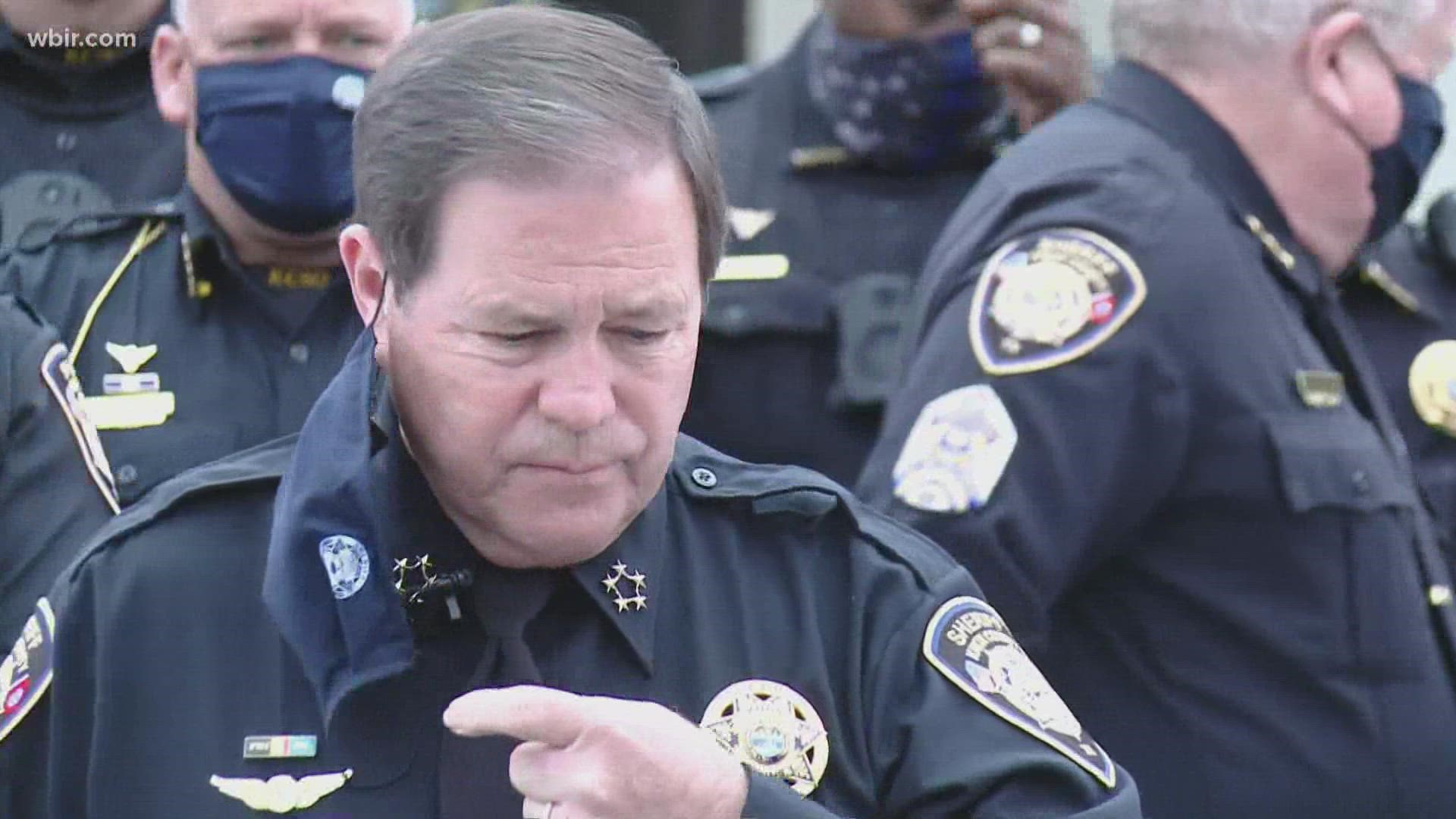KNOX COUNTY, Tenn. — Knox County Sheriff Tom Spangler said Monday evening in a letter addressed to the White House that he would oppose any vaccine mandates for his staff. This came amid vocal pushback over President Joe Biden's plan announced in early September to eventually implement vaccine rules as an OSHA safety measure in federal and private workplaces.
"I knew it was probably going to ruffle some feathers that didn’t agree with me, but I knew that I had to get out there and let them know where I stood," Spangler said Tuesday.
The plan, which applies to private and federal workers, mandates COVID-19 vaccines or testing as a workplace safety guideline under OSHA. The action plan is covered by a previous executive order on COVID-19 Biden issued shortly after taking office in January, and is still awaiting a final ruling from the U.S. Office and Management and Budget before it can be implemented and published in the Federal Registrar.
Biden's plan called on OSHA to issue an amendment to the COVID-19 Emergency Temporary Standard to require vaccines or routine testing as a workplace safety measure in private companies employing more than 100 people, which would be enforced through heavy fines and penalties. It also mandates vaccines in federal workplaces without the testing option.
For federal workers and contractors, many workplaces have already begun mandating vaccines, which has led to lawsuits.
Spangler called the plan "unconstitutional" and "government overreach," claiming it would put the lives of Knox County citizens at risk because he said it would lead to law enforcement leaving the job in large numbers if enforced.
WBIR legal analyst Don Bosch said the mandate would not be unconstitutional—and said the sheriff's decision to announce his opposition to the federal government may be political ahead of next year's election.
"The science clearly supports use of the vaccine, the sheriff himself has taken the vaccine. It makes no sense, this is playing to the political base," Bosch said.
Spangler also said he feared deputies would quit if they were required to get the shot—exacerbating a staffing problem within law enforcement.
"If we mandated something like that, Knox County is going to suffer. The citizens of Knox County will suffer out here because of our numbers," he said. "We’re already losing people today and those numbers cannot continue to go down."
It is uncertain if Knox County government or the sheriff's office would face vaccine mandates even if the plan is approved on the federal level, though.
Workers employed by state or local governments aren't under OSHA's federal jurisdiction per the OSH Act of 1970, meaning a federal vaccine mandate -- even if it's enforced through federal OSHA -- would not legally apply to most state or local government agencies like KCSO.
There is a noteworthy exception when it comes to Tennessee, though. The state is one of 21 in the U.S. that adopted an OSHA-approved state plan that allows the state itself to oversee, enforce and tailor certain workplace safety guidelines for all employers minus federal workers, so long as the state's rules are "at least as effective" as federal OSHA rules.
State and local government workers are offered some OSH Act protections thanks to the state plan. Because the plan is enacted and enforced on the state level, that means state and local agencies are also required to follow TOSHA guidelines alongside private workplaces.
This means KCSO and all other employers -- private, local, or state -- are supposed to follow any state guidelines covered under the OSHA agreement.
With this new vaccine rule, it would ultimately be up to the state of Tennessee and TOSHA -- and not the federal government -- to also create one and ensure any state, local or private workplaces are enforcing those workplace rules. Given the vocal pushback from Governor Bill Lee and the vast majority of state lawmakers, though, it does not appear likely that workplace vaccine rules will be enforced on the state level.
A congressional report issued a few days after Biden's announcement in September anticipated this outcome, and delved into what it meant for those states at large.
Most states do not utilize OSHA-approved state plans, meaning it is up to OSHA to carry out any enforcement across roughly 60% of the U.S. workforce. OSHA can enforce rules in federal and private workplaces in those states, but not local or state government workplaces such as law enforcement agencies, city offices, or the like.
Because Tennessee has a state plan with OSHA, though, the congressional report said the state would risk seeing OSHA terminate the plan if federal vaccine rules are issued and it fails to enforce standards "at least as effective" as the federal side. If the plan is terminated, it would mean all private businesses across the state would suddenly find themselves under federal OSHA standards.
COVID-19 has been the number one cause of death for law enforcement by a wide margin since the pandemic began in 2020, killing nearly five times as many officers as shootings. Officers face a high risk of exposure on the job due to the nature of patrol work and coming in close contact with people.
In January 2021, KCSO announced Warrants Officer Toby Keiser died due to COVID-19.

